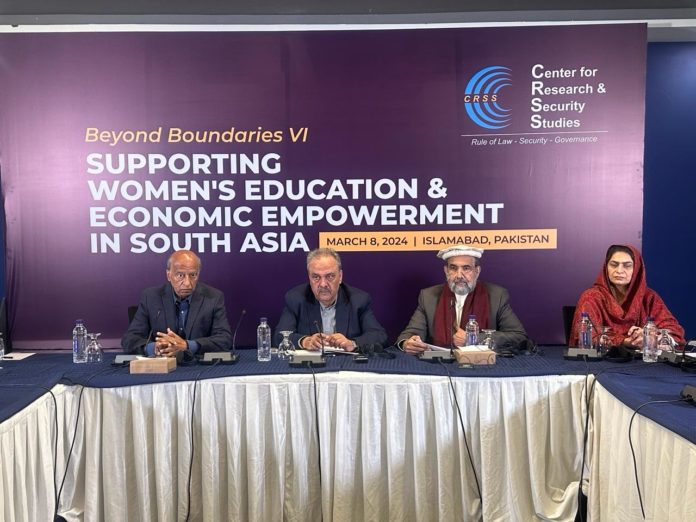Refusal of Afghans to cross into Pakistan with a passport defies the logic of relations between two sovereign countries, Pakistan’s Special Representative on Afghanistan, Ambassador Asif Durrani said during his interaction with the Afghan religious, tribal, and business stakeholders, while highlighting the security threats posed by Tehreek-e-Taliban Pakistan (TTP) and the detrimental effects of their activities on Pakistan’s security.
The interaction was part of the Pak-Afghan Stakeholders Conference organized by the Center for Research and Security Studies (CRSS), in collaboration with its Afghan partner Organization for Economic Studies and Peace (OESP), as part of their initiative Beyond Boundaries.
Ambassador Asif Durrani emphasized the need for cooperation in countering terrorism (CT) efforts and promoting peace in the region. He emphasized that terrorist groups like Daesh (ISIS) pose a threat not only to Afghanistan but also to the wider region and the world. He stressed the importance of collective efforts to combat terrorism and promote sustainable regional peace.
The envoy addressed issues related to trade and border management, emphasizing the importance of documentation such as passports and CNICs for security purposes. He advocated the necessity of implementing biometric measures for border cross-border movement of people to bolster security and minimize threats from non-state actors.
Ambassador Durrani stressed the need for mutual respect for sovereignty between Pakistan and Afghanistan. He refuted the perception of Pakistan using coercion in its dealings with Afghanistan and said the refusal of Afghans to cross into Pakistan with a passport defies the logic of relations between two sovereign countries.
Durrani accused external actors, particularly India, of supporting TTP militants, citing evidence of their involvement, and underscored the need to address the issue of the militant outfit’s funding and external support.
The envoy expressed Pakistan’s commitment to ongoing discussions with Afghanistan and assured that efforts were underway to address existing challenges and achieve positive outcomes.
Ambassador Asif Durrani also interacted with female Afghan students to address concerns and queries regarding educational opportunities, internships, visa procedures, and other challenges faced by Afghan students studying in Pakistan.
Ambassador Durrani highlighted the scholarships provided by the Pakistani government to Afghan students and emphasized how such endeavors provide equal educational opportunities to them in Pakistan. He mentioned that 4,500 scholarships were announced for Afghan students under the Allama Muhammad Iqbal Scholarship program with 1,500 dedicated to Afghan women, covering various fields of study for a duration of up to five years.
Afghan students underscored that they should be given opportunities for internships in Pakistan, post the completion of their educational tenure in the country to help equip them with practical hands-on experience and enable them to apply the acquired skills in their home communities. They also inquired about online programs and digital skill development opportunities.
Issues related to visa procedures and work permits were also discussed, with students expressing difficulties in obtaining work permits after completing their studies. Ambassador Durrani clarified the process and responsibilities regarding visa changes; from student to work visas, mentioning the involvement of the Ministry of Interior in work visa matters.
Concerns were raised regarding the accreditation of online schools and the recognition of degrees obtained from them. Ambassador Durrani emphasized that degree recognition falls under Afghanistan’s jurisdiction and suggested that these matters should be addressed internally by the Afghan government.
Afghan students highlighted border issues, prolonged queues, and administrative challenges, including the discontinuation of SIM cards upon their student visa expiration. They requested streamlined procedures and increased support for completing studies and renewing visas.
The requirement of a mahram (male guardian) for female students to cross the border was discussed, with Ambassador Durrani advising students to plan accordingly and bring a mahram when necessary. He emphasized the importance of adhering to visa procedures and regulations.
The interaction between the special envoy and Afghan students provided a platform for addressing various concerns related to education, internships, visa procedures, and cultural perceptions. Ambassador Durrani emphasized Pakistan’s commitment to supporting Afghan students and efforts to facilitate the educational journey of Afghan students and address their needs effectively.




